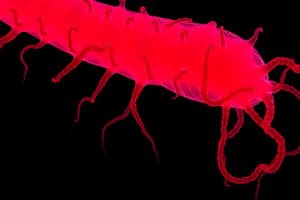Podcast
Questions and Answers
Which of the following is NOT a common infectious etiology associated with acute diarrhoea?
Which of the following is NOT a common infectious etiology associated with acute diarrhoea?
- Clostridium difficile (correct)
- Escherichia coli
- Rotavirus
- Norovirus
What is a key characteristic that can help differentiate viral gastroenteritis from bacterial causes?
What is a key characteristic that can help differentiate viral gastroenteritis from bacterial causes?
- Shorter duration of illness (correct)
- Gradual onset of symptoms
- High-grade fever
- Presence of blood in stool
In diagnosing a patient with acute diarrhoea, what is the most important component of the diagnostic strategy?
In diagnosing a patient with acute diarrhoea, what is the most important component of the diagnostic strategy?
- Physical examination findings
- Assessment of dietary habits
- Routine blood tests
- Travel history and exposure risk (correct)
Which of the following is NOT a common treatment strategy for the management of infectious diarrhoea?
Which of the following is NOT a common treatment strategy for the management of infectious diarrhoea?
What is a key piece of advice for people traveling abroad to reduce the risk of developing traveller's diarrhoea?
What is a key piece of advice for people traveling abroad to reduce the risk of developing traveller's diarrhoea?
When should individuals seek medical advice if they suspect they have food poisoning by toxin-producing bacteria?
When should individuals seek medical advice if they suspect they have food poisoning by toxin-producing bacteria?
What is a common source of outbreaks for norovirus?
What is a common source of outbreaks for norovirus?
Which diagnostic test is typically used for rotavirus infection?
Which diagnostic test is typically used for rotavirus infection?
What is the recommended treatment for non-severe Clostridium difficile infection (CDI)?
What is the recommended treatment for non-severe Clostridium difficile infection (CDI)?
What is a distinctive clinical feature of an Entamoeba infection that differentiates it from other causes of diarrhea?
What is a distinctive clinical feature of an Entamoeba infection that differentiates it from other causes of diarrhea?
When should the rotavirus vaccine ideally be administered?
When should the rotavirus vaccine ideally be administered?
What distinguishes the presentation of inflammatory Clostridium difficile infection (CDI) from non-inflammatory CDI?
What distinguishes the presentation of inflammatory Clostridium difficile infection (CDI) from non-inflammatory CDI?
What is the most common mode of transmission for gastroenteritis?
What is the most common mode of transmission for gastroenteritis?
Which of the following viruses is the most common cause of gastroenteritis in children?
Which of the following viruses is the most common cause of gastroenteritis in children?
What is the main clinical presentation of acute gastroenteritis?
What is the main clinical presentation of acute gastroenteritis?
How is gastroenteritis diagnosed?
How is gastroenteritis diagnosed?
What is the recommended treatment for mild travelers' diarrhea symptoms?
What is the recommended treatment for mild travelers' diarrhea symptoms?
Which of the following agents should be avoided in cases of severe travelers' diarrhea?
Which of the following agents should be avoided in cases of severe travelers' diarrhea?
What is the primary preventative measure to avoid travelers' diarrhea?
What is the primary preventative measure to avoid travelers' diarrhea?
Flashcards are hidden until you start studying
Study Notes
Gastrointestinal Infections
- Gastroenteritis: inflammation of the stomach, small bowel, and large intestines, mostly caused by infectious agents, but can also be due to ingestion of certain drugs or toxins.
- Most common pathway: faecal-oral transmission of viruses, including Rotavirus, Norovirus, Astrovirus, and Adenovirus.
Aetiologies of Gastroenteritis
- Norovirus:
- Referred to as the 'winter vomiting bug', but not limited to winter.
- Highly transmissible, causing outbreaks in hospitals, nursing homes, schools, and cruises.
- Contaminated food and waterborne transmission.
- Rotavirus:
- Vaccine has been used routinely in Ireland since 2016, providing 82-94% protection against rotavirus types.
- Two-dose oral vaccine, given at 2 and 4 months, must be given prior to 8 months of age.
- Entamoeba:
- Protozoa that can burrow into intestinal walls and spread, causing septicemia and liver damage.
- Source: foodborne, waterborne, fecal-oral, and prepared foods (usually cattle-related).
Clinical Presentation of Gastroenteritis
- Acute onset
- Anorexia
- Nausea and vomiting
- Watery diarrhoea
- Abdominal pain
- Fever
- Malaise
- Signs of dehydration: dry or cracked lips, poor skin turgor, tachycardia
- Severe dehydration: altered mental status, sunken eyes, weight loss
Diagnosis and Treatment of Gastroenteritis
- Diagnosis: usually made through history, but may require stool culture, microscopy, and PCR for viral aetiologies.
- Treatment:
- Oral rehydration (rarely may need IV rehydration for severe dehydration)
- Antidiarrheal agents (usually not needed)
- Antiemetics (usually not needed)
- Probiotics (may shorten duration of diarrhoea by one day)
Travelers' Diarrhoea
- Risk factors: development of diarrhoea in individuals from a resource-rich setting during or within 10 days of returning from travel to a resource-limited setting.
- Aetiologies: bacterial, viral, and parasitic, including ETEC, Campylobacter, Shigella, Norovirus, Rotavirus, Giardia, Cryptosporidium, Salmonella, and Vibrio.
- Presentation: malaise, anorexia, abdominal cramps, sudden onset of watery diarrhoea, lasting 1-5 days.
- Diagnosis: clinical diagnosis, testing not usually required, but can send stool for culture, microscopy, and toxin assay if prolonged symptoms or severe symptoms with fever.
- Treatment:
- Fluids: frequent sips of diluted juice or electrolyte drinks
- Solids: bland foods, avoiding dairy products
- Antimicrobials: Azithromycin for severe symptoms
- Symptomatic therapy: antidiarrheal agents, antimotility agents, and bismuth subsalicylate
Prevention of Travelers' Diarrhoea
- Avoid high-risk foods
- Wash hands before every meal
- Water purification: boiling, adding 5% bleach solution or iodine, or using water microfiltration systems
- Antimicrobials: pre-prescribing not recommended, unless immunocompromised host
- Vaccinations: ETEC vaccine is ineffective, but cholera vaccine is recommended for those traveling to endemic areas
Studying That Suits You
Use AI to generate personalized quizzes and flashcards to suit your learning preferences.




